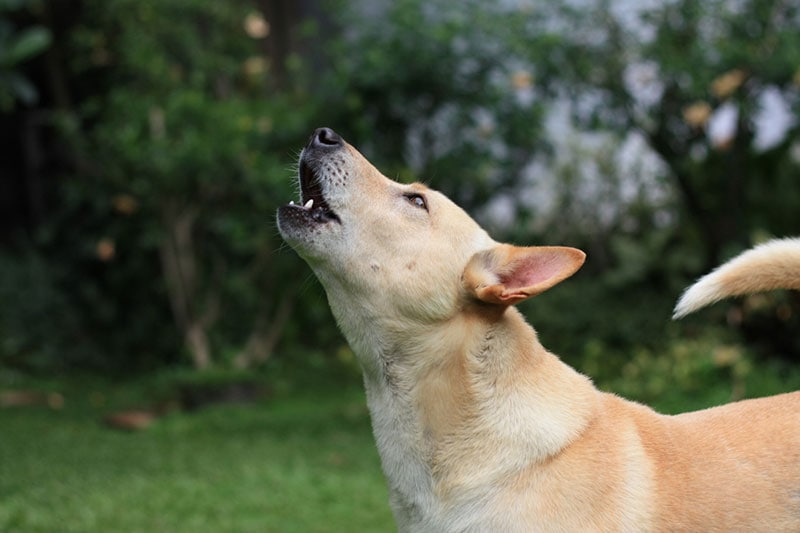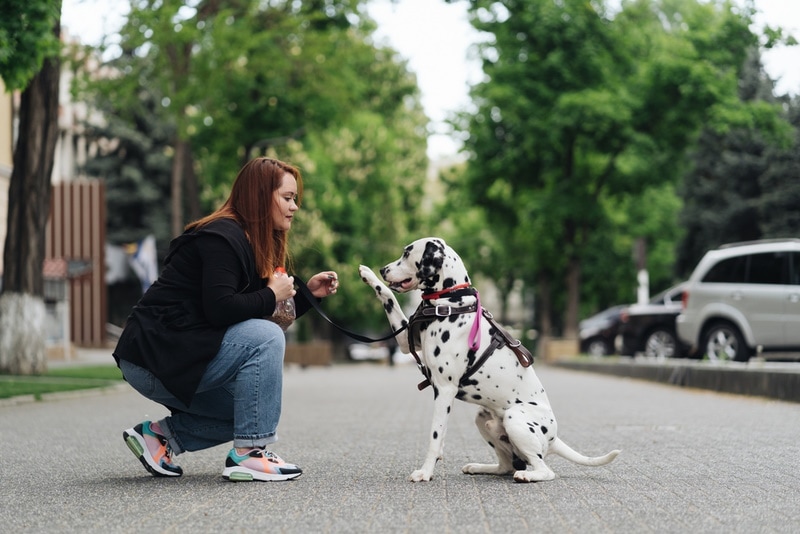Why Do Dogs Howl at Sirens? 6 Reasons

Updated on

Click to Skip Ahead
Dogs howling at sirens is a familiar and intriguing scene that plays out in neighborhoods across the world. The wailing of sirens triggers a chorus of howls from dogs which can be annoying to anyone who does not understand why that happens.
There is no clear-cut reason why a dog would howl at a siren. Instead, it is a combination of reasons, which vary from dog to dog. Still, this behavior is something worth looking into.
This article will delve into these reasons. We will also explore the nature of howling in dogs.
Why Do Dogs Howl?
Howling is a form of vocalization that sets dogs apart from other animals. It involves emitting long, drawn-out sounds that vary in pitch and volume. Dogs can vocalize using low, mournful howls or high-pitched, piercing cries. The unique acoustics of a howl carry across open spaces, ensuring other dogs and humans can hear them over significant distances.
Howling is a natural behavior in dogs. The act is rooted in their ancestral roots as descendants of wolves who used howling to communicate and bond socially with other park members. With time, the domestication of dogs has changed some of their natural behaviors. However, their inherent instinct to howl remains intact.
Unlike barking, which is often associated with immediate and localized responses, howling tends to be a more generalized form of communication. It conveys emotions, intentions, and the presence of the howler to a broader audience.
Therefore, howling serves as a means of bonding, expressing distress, and coordinating activities. It can communicate various emotions, including loneliness, fear, excitement, and celebration.

The 6 Reasons Why Your Dog Howls at Sirens
The reasons why dogs howl generally do not vary too much from why they howl at sirens. However, it helps to understand why your dog howls every time a siren passes.
1. Sensitivity to Sound
Dogs have a remarkable sensitivity to sound. They have an acute sense of hearing, which far surpasses that of humans. To put it into context, humans can typically hear sounds within the range of 20 to 20,000 Hertz. On the other hand, dogs can detect frequencies as high as 65,000 Hertz or more, depending on the breed.
Sirens, with their loud and distinctive wailing tones, are designed to capture attention and alert people to the presence of emergency vehicles. These sounds can be particularly intense for dogs, triggering their instinctual response to howls.
2. To Communicate
When a dog hears a siren, it may interpret the sound as a distant howl from another pack member. This perception can prompt the dog to respond by joining in and vocalizing through howling. Essentially, the dog may attempt to communicate or establish contact with what it perceives as a distant pack member.
In addition, the piercing nature of sirens can evoke a dog’s natural response to potential threats. Loud, sudden sounds like sirens can activate a dog’s fight-or-flight response. This will, in turn, trigger an instinctual need to vocalize and alert others to potential danger.
In this case, the dog’s howling in response to sirens may serve as a way to warn its pack members or claim territory, reinforcing the instinctual protective nature ingrained in canines.

3. Instinctual Response
Dogs have an instinctual response to certain stimuli that they borrow from their wolf ancestors. This response comes from their inherent range of instincts, which can influence their behaviors, including howling in response to sirens. Therefore, the sudden burst of a siren can trigger the following instincts.
Prey Drive
Dogs possess a natural prey drive, an instinctual motivation to chase and capture prey. The high-pitched, attention-grabbing sound of a siren can trigger this instinct in some dogs. They may interpret the siren as a call to action and respond by howling as if they are joining a pack of fellow hunters.
Not all dogs will exhibit this response, as individual variation and training play a role in modulating their prey drive.
Territorial Behavior
Dogs have a strong sense of territoriality and often mark their territory through various means, including vocalization. When a siren blares in the distance, dogs may perceive it as an intrusion into their territory, especially if they are at home.
They may howl to assert their presence and warn the perceived intruder. This instinctive territorial response aims to communicate the dog’s presence and readiness to defend its territory.
4. Learned Behavior
Your dogs can also howl at sirens because they learned it from somewhere. Dogs are highly adaptable and capable of associating specific cues with certain events or experiences. Therefore, they can learn to associate the sound of a siren with particular situations, leading to a learned response of howling.
Three forms of conditioning influence a dog’s response to sirens. These are.
Classical Conditioning
Dogs are good at associating stimuli and outcomes through classical conditioning. Over time, if a dog constantly hears sirens in conjunction with the presence of emergency vehicles, such as fire trucks or police cars, it may start associating the sound of sirens with these events.
As a result, whenever your dog hears a siren, it may anticipate the arrival of emergency vehicles and respond by howling.
Social Reinforcement
Dogs are highly social animals that often seek attention and interaction from their human companions. You may respond to your dog every time they howl in response to a siren. Even if the attention you provide is in the form of reprimands or attempts to calm the dog down, the dog perceives it as a form of social interaction and reinforcement.
Consequently, the dog may learn that howling at sirens is an effective way to gain attention, leading to repeated behavior.
Vocal Imitation
Dogs can imitate sounds and behaviors. If your dog hears sirens frequently and observes other dogs or humans howling in response, it may learn to imitate the behavior.
Also, dogs are highly attuned to vocal cues and can mimic sounds they hear, including the wailing tones of sirens. Once they discover howling is a way to communicate and respond to certain sounds, they may continue to do so when exposed to sirens.
Note that learned behavior is not limited to a single form of conditioning. Dogs may exhibit a combination of classical conditioning, social reinforcement, and vocal imitation in their response to sirens.
The strength and persistence of the learned behavior can also vary depending on factors such as the dog’s individual learning history, the consistency of the association between sirens and specific events, and the reinforcement received from their environment.

5. Vocalization and Emotional Expression
Dogs use vocalization in the form of howling to communicate their feelings and needs. Unlike vocal imitation, where dogs use their voice to imitate other sounds, vocalization is a form of expression.
Sirens can evoke anxiety and distress in dogs due to their loud and unfamiliar nature. Dogs may interpret the sound as a potential threat or disturbance, which, in turn, stresses them out. Therefore, howling becomes a way for dogs to release and express their anxiety, vocalizing their discomfort to seek reassurance or signal their need for support from their human or canine companions.
The sound of the siren may also startle or excite them, triggering an instinctual urge to vocalize. Dogs may howl in response to the heightened emotional arousal caused by the sirens, expressing their excitement, confusion, or even fear. Howling becomes a way to release and communicate their emotional state to those around them.
6. Breed and Individual Differences
Not all dogs howl at sirens. Breed characteristics, temperament, and experiences can influence the frequency, intensity, and propensity for howling in response to sirens.
For example, dog breeds like Siberian Huskies, Alaskan Malamutes, and Beagles are more prone to howling due to their genetic predispositions and historical roles. They were selectively bred for tasks that required vocal communication, such as hunting or pulling sleds. Therefore, their genetic heritage makes them more likely to engage in howling behavior, including howling at sirens.
Some dogs are naturally more vocal and expressive, while others may be quieter and less inclined to howl. This boils down to individual temperament. Dogs with a more independent or aloof temperament may be less likely to howl in response to sirens. On the other hand, more sociable and vocal dogs may be more prone to vocalizing their emotions through howling.
Finally, experiences and exposure to sirens can shape a dog’s response. Dogs with positive or neutral experiences with sirens may be less likely to howl. In contrast, those with negative associations or traumatic encounters may exhibit more intense or fearful howling responses. How you socialize and train your dog in their formative stages can also influence their behavior and howling tendencies.

How to Manage Howling in Dogs
Dealing with excessive howling can be challenging for dog owners. However, managing and minimizing howling behavior in response to sirens is possible if you understand why they howl and apply proactive measures.
Create a Calming Environment
Dogs can be sensitive to their surroundings, and sirens can increase this sensitivity. Therefore, creating a calm and secure environment is essential to help reduce their anxiety and the urge to howl.
Provide a comfortable and quiet space for your dog, with access to their favorite toys, bedding, and a familiar scent. Use sound-masking techniques like white noise or calming music to help drown out external sounds, including sirens.
Use Distraction and Mental Stimulation
You might want to redirect your dog’s attention away from the sound of sirens. Engage them in mentally stimulating activities to grab their attention. Provide puzzle toys, treat-dispensing toys, or engage in other activities that challenge their minds. This will help prevent or reduce howling in response to sirens.

Apply Desensitization and Counterconditioning
Gradual exposure to sirens and positive experiences can help desensitize your dog to the sound. This is especially useful if you live in a place prone to sirens, such as near a hospital.
Start by playing recorded siren sounds at a low volume while engaging your dog in enjoyable activities or rewarding them with treats. Gradually increase the volume over time, ensuring your dog remains calm and relaxed. This technique helps create a positive association with the sound of sirens and can reduce the likelihood of howling.
Seek Professional Help
Consider talking to a professional dog trainer or behaviorist if your dog’s howling behavior persists or becomes problematic. A professional can assess your dog’s specific situation, provide tailored advice, and develop a behavior modification plan to address excessive howling.
Consider Anxiety Management for Your Dog
Explore anxiety management options if the howling comes from anxiety or fear. Medication, natural remedies, and behavior modification techniques can help alleviate your dog’s stress and reduce howling episodes. Remember to always consult a qualified veterinarian before considering any medication for your dog.

Do Not Reinforce the Behavior
While it’s important to comfort and support your dog, be cautious not to reinforce the howling behavior unintentionally.
Avoid scolding or punishing your dog for howling, as it may exacerbate their anxiety or emotional distress. Instead, provide reassurance through calm and soothing tones, or redirect their focus to an alternative behavior.
Final Thoughts
Recognizing the nature of howling in dogs allows us to appreciate its origins in their ancestral heritage and its role in communication and social bonding. Usually, dogs howl at sirens because of sensitivity to sound, instinctual responses, emotional expression, breed tendencies, and individual differences.
The strategies we have discussed above will allow you to minimize excessive howling and promote your pet’s emotional well-being. At the end of the day, you need to understand that it is only natural for dogs to howl when sirens blare.
Featured Image Credit: Cecil Kasih, Shutterstock












